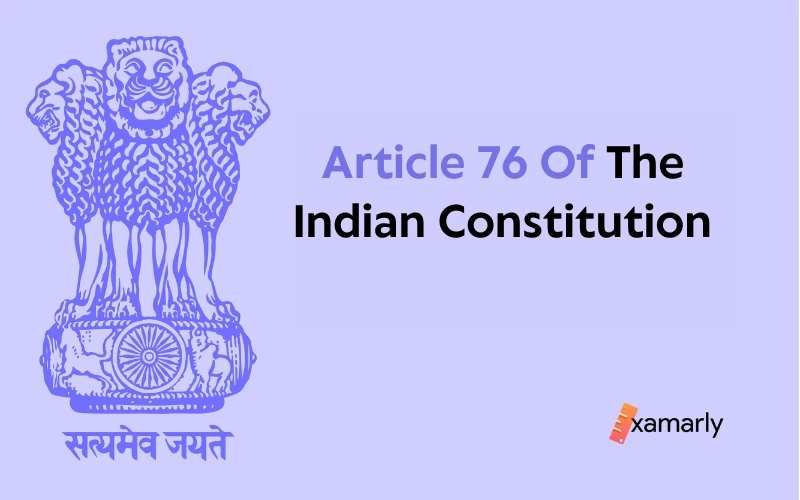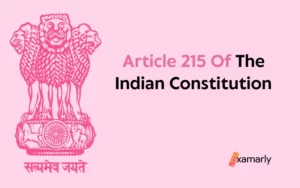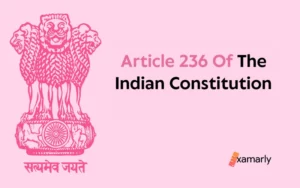A person qualified to serve as a Supreme Court judge must be chosen for the position of Attorney General. Article 76 of the Indian Constitution creates the position of Attorney General of India. The said Article is enshrined in Part V of the Constitution.
This article provides information about the Constitutional Bodies of the Attorney General of India, which is on the UPSC Indian Polity and Governance Syllabus.
- Article 76 Of The Indian Constitution: Constitutional Provisions
- Who Is The Attorney General?
- Appointment and Term
- Roles And Responsibilities Under Article 76
- List of Attorney Generals in India
- Conclusion
- UPSC PYQs
- FAQs
- What Is The Subject Of Article 76 Of The Indian Constitution?
- Who Has The Authority To Appoint The Attorney General Of India?
- Who Sets The Attorney General Of India's Remuneration?
- What Are The Rights Of The Attorney General?
- Who Is The Current Attorney General Of India?
- Who Is The first attorney general of India?
- Which Attorney General Hold The Office For Shortest Time Period?
Article 76 Of The Indian Constitution: Constitutional Provisions
Article 76 speaks about the Attorney-General of India in Part V of The Constitution. The provisions of Article 76 are mentioned below in the following four clauses:
- The Attorney-General of India will be chosen by the President from among those eligible to serve as Supreme Court judges.
- In addition to discharging the obligations conferred upon him by or under this Constitution or any other law for the time being in effect, the Attorney-General must advise the Government of India on such legal matters and perform such other tasks of a legal character as may from time to time be referred or assigned to him by the President.
- For the purpose of carrying out his responsibilities, the Attorney General is entitled to a right of audience in any and all courts located within the geographical boundaries of India.
- The Attorney-General will serve at the pleasure of the President and be paid in accordance with his or her discretion.
Who Is The Attorney General?
He or she is referred to in Article 76 of the constitution as being the highest law officer in India.
As the chief legal advisor to the Indian government, he advises the union government on all legal issues.
In addition to that, the Union Government of India is represented by him in India’s highest court by far, the Supreme Court.
The position of Attorney General, like that of Advocate General in a state, is not meant to be filled by a political appointee, but in reality, this is not the case.
Appointment and Term
As per Article 76, the appointment of the Attorney general and the term of office are mentioned below:
- The President of India is responsible for making the appointment of the Attorney General, and this individual must meet the requirements necessary to serve as a judge on the Supreme Court.
- That is, he or she must be a citizen of India and must have served as a judge of some high court for a period of five years or as an advocate of any high court for a period of ten years, or they must be considered an eminent jurist in the view of the president.
- He or she serves in that capacity at the discretion of the president, which implies that the president retains the power to remove him or her from office at any time.
- The Constitution does not stipulate the amount of remuneration that the Attorney General is entitled to receive; rather, this figure is left up to the discretion of the President.
Roles And Responsibilities Under Article 76
- Providing legal counsel to the Government of India on subjects brought before it by the President.
- To fulfill any additional legal duties that the President may entrust to him in this regard.
- To carry out the duties imposed by the Constitution or another piece of legislation.
List of Attorney Generals in India
You will find a list of former Attorneys General of India below, which will provide you with useful information and answer any queries you may have regarding who, when, and for how long someone served in that role.
| Attorney General | Term |
|---|---|
| M.C. Setalvad | 28th of January 1950 till the 1st of March 1963 |
| C.K. Daftari | 2nd of March 1963 till the 30th of October 1968 |
| Niren de | 1st of November 1968 till the 31st of March 1977 |
| S.V. Gupte | 1st of April 1977 till the 8th of August 1979 |
| L.N. Sinha | 9th of August 1979 till the 8th of August 1983 |
| K. Parasaran | 9th of August 1983 till the 8th of December 1989 |
| Soli Sorabjee | 9th of December 1989 till the 2nd of December 1990 |
| J. Ramaswamy | 3rd of December 1990 till the 23rd of November 1992 |
| Milon K. Banerji | 21st of November 1992 till the 8th of July 1996 |
| Ashok Desai | 9th of July 1996 till the 6th of April 1998 |
| Soli Sorabjee | 7th of April 1998 till the 4th of June 2004 |
| Milon K. Banerjee | 5th of June 2004 till the 7th of June 2009 |
| Goolam Essaji Vahanvati | 8th of June 2009 till the 11th of June 2014 |
| Mukul Rohatgi | 12th of June 2014 till the 30th of June 2017 |
| K.K. Venugopal | 30th of June 2017 till 1st of October 2022 |
| R. Venkataramani | 1st of October 2022 till date |
Conclusion
The role of the Attorney General of India is outlined in detail in Part V of the Indian Constitution, namely Article 76. The provisions covered in four clauses speak about who will serve as Attorney General and who will appoint for that post, what will be his/her responsibilities, for how long he will serve in that capacity, and what he will receive in the form of salary.
Candidates who are getting ready to take the forthcoming UPSC exam should prioritize learning about the Attorney General of India as one of the most significant subjects to study for the examination.
Also to learn about other important subjects for IAS Exam preparation, check out the linked article from the table mentioned below:
UPSC PYQs
Throughout the entirety of the IAS Exam, aspirants for the IAS should pay attention to the section named “Attorney General” which is enshrined in Article 76.
You can evaluate your comprehension with the previous UPSC questions and FAQs provided below.
Consider the following statements about the Attorney General of India: [ UPSC 2001 ]
- He is appointed by the President of India.
- He must have the same qualifications as are required for a Judge of the Supreme Court.
- He must be a member of either House of Parliament.
- He can be removed by impeachment by Parliament.
Which of these statements is correct?
(a) 1 and 2
(b) 1 and 3
(c) 2, 3 and 4
(d) 3 and 4
Ans (a)
Explanation: It is the president’s responsibility to designate the Attorney General, and the individual chosen for the position must meet all of the requirements necessary to serve on the Supreme Court. As a result, Statements 1 and 2 are true.
An Attorney General is not required to be a member of Parliament under any circumstances. As a result, Statement 3 is untrue.
The Constitution does not specify the length of the Attorney General’s term in office. Furthermore, neither the manner nor the grounds for his or her dismissal are covered under the Constitution. Consequently, he or she serves at the pleasure of the president, who has the power to fire them at any moment.
As a result, Statement 4 is untrue. Thus a correct answer is an option (a).
FAQs
The following is a list of the questions that people search for the most or that they ask the most frequently. Your study into Article 76 of the Constitution will be strengthened if you look more closely at all of these questions, as well as the answers that were provided for those questions.
What Is The Subject Of Article 76 Of The Indian Constitution?
The right of the President to nominate someone suitably competent for the position of Attorney General of India is covered under Article 76 of the Indian Constitution. It also outlines the responsibilities, privileges, authority, and salary of the Attorney General of India.
Who Has The Authority To Appoint The Attorney General Of India?
The President of India appoints the country’s Attorney General, and that individual must meet the same standards as a Supreme Court justice.
Who Sets The Attorney General Of India’s Remuneration?
According to clause 4 of Article 76, the President of India has the authority to set the salary of the Attorney General of India.
What Are The Rights Of The Attorney General?
While carrying out his official responsibilities, the Attorney General of India has the privilege of appearing before any court in India.
Who Is The Current Attorney General Of India?
At present, Venkataramani Rajagopalan serves as India’s Attorney General, a position he has held since 01 October 2022. His term in office will last for three years. He takes over after K.K. Venugopal, who served as AG from June 30, 2017, to October 1, 2022, making him the 16th AGttorney General to do so.
Who Is The first attorney general of India?
Between the dates of the 28th of January 1950 and the 1st of March 1963, M.C. Setalvad served as the First Attorney General of India. To this day, he holds the record for the longest time spent serving as Attorney General, having done so for a total of 13 years.
Which Attorney General Hold The Office For Shortest Time Period?
The length of time that Soli Sorabjee served as Attorney General was significantly shorter than any other Attorney General. Even so, he was appointed to the position not once, but twice. The first time he served in this capacity was from 9 December 1989 to 2 December 1990. He then served in this capacity again from 7 April 1998 until 4 June 2004.






